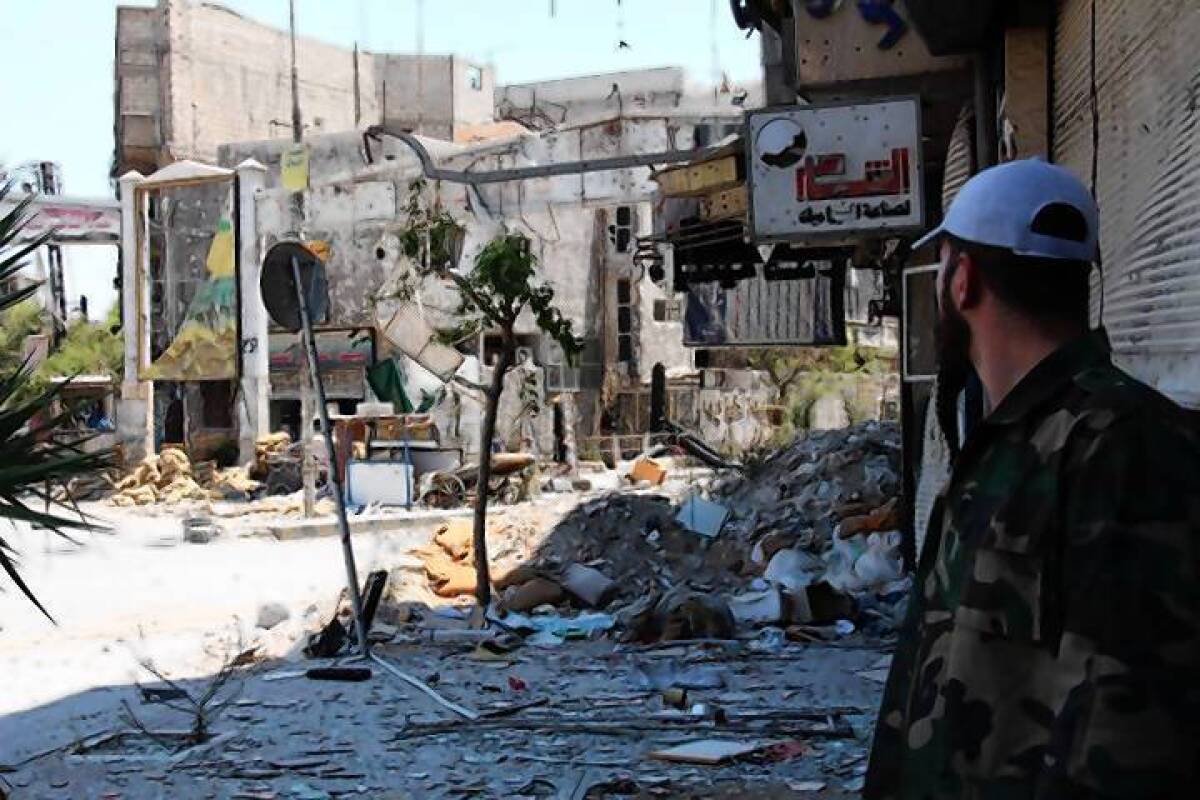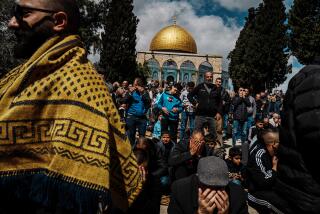Syrian Palestinians pack Lebanon refugee camp

BURJ EL-SHEMALI, Lebanon — The midday heat is stifling in the living room of the cramped apartment where Rania resides with her two sisters, their husbands, children and various other relatives who have invited them in. Fans in the corner are still: The power is off 20 hours a day in this densely populated Palestinian refugee camp, east of the southern Lebanese city of Tyre.
Decades ago, tents here gave way to gray concrete buildings, with heat-trapping zinc roofs that were meant to be temporary. This room, immaculately kept, is for visitors; a peek inside the only other room reveals a tangle of bodies, sleeping off the hottest and hungriest hours of this scorching day in the recent fasting month of Ramadan.
Rania, 36, and her husband, Yusuf, 51, fled here with their two children in December from their home in Yarmouk, a sprawling district in the southern fringes of Damascus that was founded as a Palestinian refugee camp but evolved into a bustling home to both Palestinians and Syrians.
Yarmouk, like many other areas on the edges of Damascus, is now another debris-strewn battleground in Syria’s raging civil war.
For their entire lives, Rania and Yusuf were Palestinian refugees in Syria. Now they are Syrian Palestinian refugees in Lebanon.
Rania and her family (for security reasons, none wanted their full names used) are among more 90,000 Syrian Palestinians who have fled to neighboring Lebanon, often staying with relatives who live in the two dozen formal Palestinian camps, all already notoriously overcrowded and lacking in services.
The Palestinians are a minority among the more than 600,000 Syrian refugees who have come to Lebanon. But their stateless status as lifelong refugees now forced to flee relatively secure lives in Syria has complicated the regional humanitarian crisis. The vast majority were born in Syria, descendants of parents and grandparents who left ancestral homes in what is now Israel.
Soon after arriving here, Rania and her family were joined by Rania’s sister Riham and her husband, Ammar, who abandoned his lingerie shop on Damascus’ Hamra Street.
While camp residents, including several relatives, have been welcoming, the Syrian Palestinians say the garbage-strewn squalor of this and other Palestinian camps in Lebanon has stunned them.
Before the war, Palestinians said they were able to lead relatively normal lives in Syria, with access to jobs, education and other benefits. In Lebanon, say human rights workers, Palestinians have long been treated as second-class residents who live in “appalling social and economic conditions,” according to a 2010 Human Rights Watch report.
“This is the first time I’ve ever seen anything like this, I still can’t believe it: the dirty streets, the lack of electricity, the broken houses, the soldiers guarding the entrances, the walls, the overcrowding,” says Ammar, incredulous at the plight of fellow Palestinians. “Animals live like this, not humans.”
He came to Burj el-Shemali from Syria in his car, a luxury for Palestinians in Lebanon. But Lebanese soldiers at the entrance wouldn’t allow him to enter the camp with the vehicle. They didn’t give him a reason.
“It’s like we’re living inside a prison,” Ammar says.
Inside Lebanon, the presence of multitudes of Palestinian refugees has long been an explosive issue. The Palestinian influx helped detonate the 15-year civil war that ended in 1990. Wary Lebanese lawmakers have strictly limited Palestinians’ access to professions, property, social services, and other benefits. They are now among the poorest communities in Lebanon.
Many Palestinians in Lebanon are relegated to working on the black market, enduring harsh conditions and low pay. Ammar, Rania’s brother-in-law, managed to find a job as a tile-layer upon his arrival from Syria. His monthly salary of $500 is more than many Palestinians in the camp bring home for several months. But as a Syrian Palestinian, he says he is paid less than his co-workers, and is often assigned the most difficult tasks. Riham, her voice resigned, says “he comes home every night exhausted and bitter — but we count ourselves lucky.”
“It’s a very bad situation,” says Abu Wassim, a Lebanese Palestinian community leader in the Burj el-Shemali camp. “There are no jobs, not enough shelter — in some situations we see 20 people living in one room. People, especially young people, are angry that support is going to the newly arrived refugees. There just isn’t enough aid to go around.”
The number of Syrian Palestinian refugees in Lebanon is probably higher than the official 90,000 figure, says Ann Dismorr, Lebanon director for the U.N. Relief and Works Agency for Palestinian Refugees in the Near East. Many, she says, don’t register with the United Nations.
In Burj el-Shemali, the population has swelled to more than 30,000, all living within an area less than 1 square mile. By comparison, the Los Angeles metropolitan area is home to about 7,000 people per square mile, according to the U.S. Census Bureau.
Pushing her hijab back on her head against the stagnant air, Rania reminisces about the only homeland she has known, Syria.
“Palestinians in camps in Syria live like Syrians,” says Rania, speaking in the sweltering flat she is sharing with a dozen relatives. “We have the same rights, the same education, the same medical treatment, the same opportunities. If a Palestinian is smart in Syria, they have the chance to travel abroad for education.”
Yusuf, who was an electric company worker and a children’s soccer coach in Damascus, sighs and runs his hands through his salt-and-pepper, close-cropped hair. “We miss our privacy the most; it’s the hardest part of living here. I miss my land, I want to go home.”
When queried which land he’s referring to, Yusuf smiles. “Our dream is Palestine. But life in Syria ... I miss Syria.”
D’Arc Taylor is a special correspondent. Times staff writer Patrick J. McDonnell in Beirut contributed to this report.
More to Read
Start your day right
Sign up for Essential California for news, features and recommendations from the L.A. Times and beyond in your inbox six days a week.
You may occasionally receive promotional content from the Los Angeles Times.






